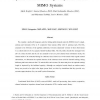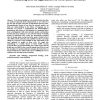433 search results - page 15 / 87 » Networks and our Limited Information Horizon |
103
Voted
CORR
2011
Springer
14 years 7 months ago
2011
Springer
We consider a multi-cell frequency-selective fading uplink channel (network MIMO) from K singleantenna user terminals (UTs) to B cooperative base stations (BSs) with M antennas ea...
86
Voted
ISCC
2006
IEEE
15 years 6 months ago
2006
IEEE
Abstract— Wireless sensor networks are ad hoc networks comprised mainly of small sensor nodes with limited resources and one or more base stations, which are much more powerful l...
95
Voted
INFOCOM
2007
IEEE
15 years 7 months ago
2007
IEEE
Abstract— Network coding substantially increases network throughput. But since it involves mixing of information inside the network, a single corrupted packet generated by a mali...
101
click to vote
ICNP
2006
IEEE
15 years 6 months ago
2006
IEEE
—Data caching can significantly improve the efficiency of information access in a wireless ad hoc network by reducing the access latency and bandwidth usage. However, designing e...
142
Voted
SOCIALCOM
2010
14 years 10 months ago
2010
Text data pertaining to socio-technical networks often are analyzed separately from relational data, or are reduced to the fact and strength of the flow of information between node...


